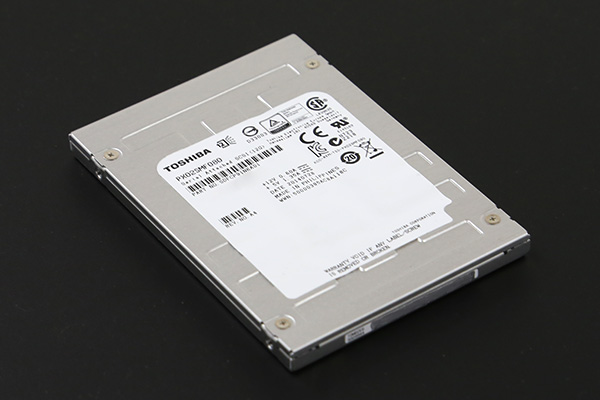Today we are publishing quick benchmark results for the Toshiba PX02SMF040 which is a 400GB SAS 3 (12gbps) SSD. We recently took a look at the larger 800GB drive as part of our SAS SSD testing series and found the Toshiba PX02SMF range to be excellent performers. These drives feature power loss protection and eMLC NAND. The eMLC NAND helps the drives achieve 10 full disk writes per day for five years which is excellent. We also saw the drives push SAS 3 speeds even topping 1GB/s in one of our tests. What we will see in our longer term benchmarking is that these drives are very consistent over time with relatively low latency.Here are the previously published SAS quick benchmarks:
Single SAS SSD Benchmarks
- Pliant/ SanDisk Lightning 206s 200GB SLC SAS SSD benchmarks
- Seagate Pulsar.2 200GB MLC SAS SSD benchmarks
- Pliant/ SanDisk Lightning 406s 400GB SLC SAS SSD benchmarks
- Smart Storage System/ SanDisk Optimus 400GB MLC SAS SSD benchmarks
- Samsung SM1625 200GB SAS SSD benchmarks
- Toshiba PX02SMF080 800GB SAS SSD benchmarks
2 Drive RAID 0 Benchmarks
- 2x SanDisk Lightning 206s 200GB SAS SSD benchmarks
- 2x Seagate Pulsar.2 200GB SAS SSD benchmarks
- 2x Smart Storage System/ SanDisk Optimus 400GB MLC SAS SSD benchmarks
- 2x SanDisk Lightning 406s 400GB SAS SSD benchmarks
- 2x Samsung SM1625 200GB SAS SSD benchmarks
Our goal is to continue posting one more per week in-between other articles and have started publishing enterprise SATA drive results also.
Test Configuration
Since we are going to assume the use of already released hardware, we are using a legacy system for testing across the test suite:
- Motherboard: Gigabyte GA-7PESH3
- Processors: Dual Intel Xeon E5-2690 (V2)
- SAS Controller: LSI SAS 3008
- RAM: 64GB DDR3L-1600MHz ECC RDIMMs
- OS SSD: Kingston V300 240GB
We are using a SAS controller so one cannot compare results directly to consumer-driven setups where a SATA SSD is connected to an Intel PCH port. There is a latency penalty for going over the PCIe bus to a controller to SAS. It also is a reason NVMe is going to be a game changer in the enterprise storage space.
Toshiba PX02SMU040 400GB SSD Quick Benchmarks
For our quick tests during this part of the series we will just provide the quick benchmarks with only a bit of commentary. The results should be fairly straightforward and the index of previous articles in this series (linked above) is a good resource to compare against.
AS SSD Benchmark
AS SSD is a solid benchmark that does not write compressible data to drives. The result is perhaps one of the best workstation SSD benchmarks available today.
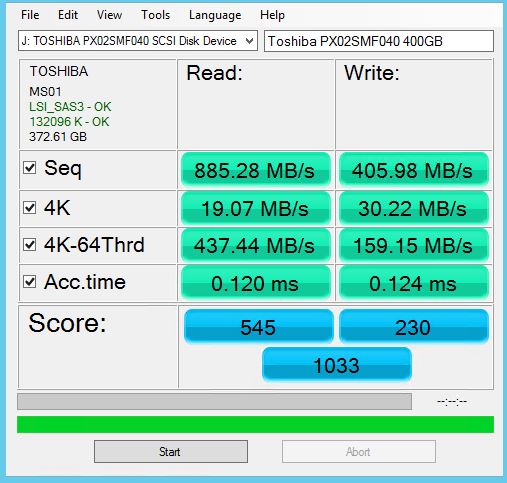
Again, we are seeing stellar read speeds from the 12gbps drive. The overall figures are extremely close to what we saw with the 800GB version of this drive.
CrystalDiskMark
CrystalDiskMark is another benchmark which gives non-compressible read/write numbers. This is in contrast to the ATTO Benchmark used by LSI/ Sandforce and its partners when they market a given solid state drive.
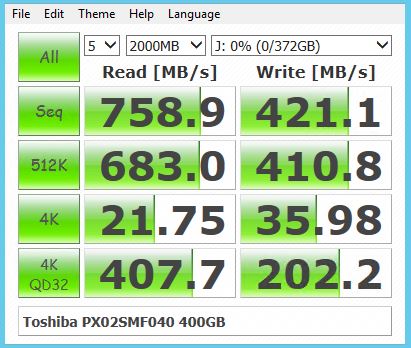
CrystalDiskMark again shows strong sequential read results.
ATTO Benchmark
The value of the ATTO benchmark is really to show the best-case scenario. ATTO is known to write highly compressible data to drives, which inflates speeds of controllers that compress data like LSI/ SandForce does prior to writing on a given solid state drive.
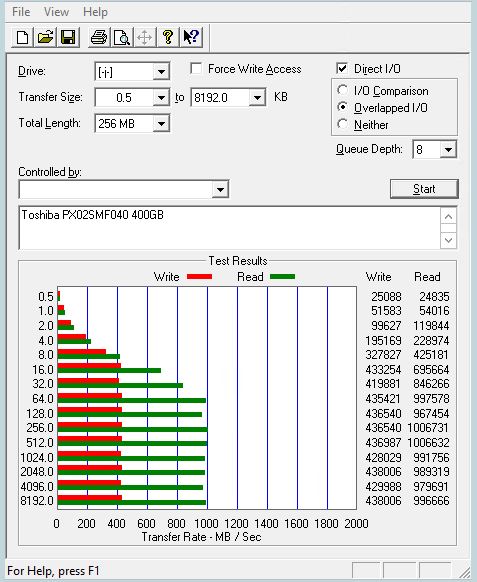
The 400GB Toshiba PX02SMF does just barely break 1GB/s in our ATTO benchmark which for 2014 is still a strong single drive result.
A preview of longer duration benchmarks
We have been subjecting these drives to torture tests involving 24 hours of preconditioning across the entire disk, then IOMeter runs at various queue depths and with standard Web Server, File Server, Database and Workstation results. Here is a quick sample output that shows a latency distribution of this drive under our Database test at Queue Depth = 32.
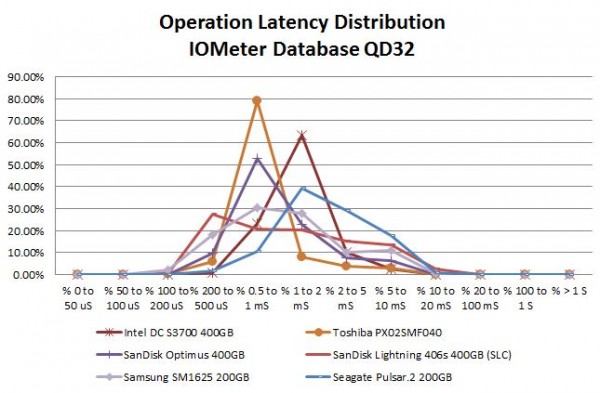
One can see that the Toshiba SMF040 performs extremely well. We still need to finish working on the presentation, however the results will be awesome.
Conclusion
The Toshiba PX02SMU040 400GB 12gbps SAS3 SSD is a solid mix of performance and endurance. Utilizing eMLC NAND for over 1GB/s sequential read performance and 10 full drive writes/day is particularly impressive. As the preview above shows, these drives absolutely shine when it comes to average latency. Feel free to join the discussion on our next generation storage benchmark presentment here.

